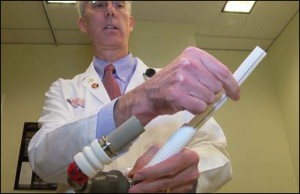Giving Patients a Change of Heart
Medical Procedure at UVA Giving Patients a Change of Heart

James Bergin, Cardiovascular Medicine
Photo source: www.nbc29.com
A novel medical procedure offered by the Division of Cardiovascular Medicine is changing the way patients with failing hearts are being treated. Medical technology is advancing quickly; just a decade ago, the survival of patients with failing hearts depended almost entirely on the availability of a heart donor. Now, a Left Ventricular Assist Device (LVAD), which doctors call a “bridge to transplant,” is changing that reality.
In October 2009, Lonnie Ison’s heart – more specifi cally, the two ventricles that pumped blood to his body – were failing. “I was ready to die…I was just tired of living like that,” Ison said. He needed a heart transplant to survive, but there was no donor available. That’s when his cardiologist suggested an LVAD implant procedure. “The first time it was offered to me, I said, ‘I don’t want it.’” But his options were limited, and eventually he changed his mind.
Dr. James Bergin, a heart failure specialist in Cardiovascular Medicine, explains that the LVAD is different from a pacemaker – it actually circulates blood throughout the body, rather than simply regulating heart rhythm. Once the battery operated pump is surgically implanted, “The blood flows from the heart through this device and then back into the aorta,” and then out to the circulatory system.
“You’re talking about a group of people who previously had about a 90% mortality rate at about a year [after diagnosis]; we have changed that around to about an 80% to 90% survival rate,” he commented.
In the absence of a heart donor, Ison’s LVAD saved his life. As technology improves, Bergin sees exciting possibilities. “We won’t need to do as many transplants, or have as long of a transplant list, because eventually we’ll have a device similar to this that can be implanted and left in place, with maintenance, long term,” he said.
Adapted with permission from article by Ed Sykes, nbc29.com.
http://www.nbc29.com/story/20034227/medical-procedure-at-uva-giving-patients-a-change-of-heart.
